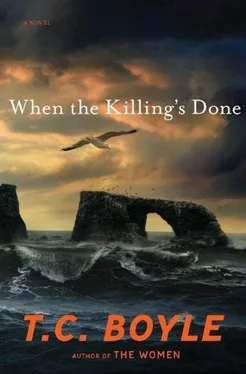He would have smiled back at her, but he only smiled when he was drunk. He might have said yes or nodded his head, but he just stared at her, numb-faced, the cap already wet through with the rain.
She kicked her boots aside, snatched the sombrero from her head and beat it twice against her thigh to knock the rain from it. “Well, go on then, don’t stand here gaping,” she said, and then she smelled the bread and took it from the oven and set it aside to cool while she rotated the spoon round the depths of the stewpot and went absolutely still when Bax called down from above, “Rita? Rita, is that you?”
Ten minutes later she was back out in the field, striding through the grass to Anise and scanning the meadow for Francisco. A breeze had come up in the interval, sheeting the rain, and at first she couldn’t make him out. She was almost to Anise when finally she spotted him, all the way across the field on the far perimeter, moving along briskly, his own variation of the shepherd’s staff — PVC pipe, with a squared-off crook cemented to the end of it — bobbing along in front of him like a bleached white antenna. He would have been more comfortable on horseback — they used the horses at roundup and for day-to-day operations and just to get out in the hills and away from the ranch — but this morning Diablo, Moreno and Jonesy were back in the corral, rubbing their backsides against the rails or lifting their muzzles to snuff at the rain, because she felt it was better not to risk even the smallest, most usual perturbation of the sheep at a time like this. So Francisco was on foot. And so was she.
Nothing had changed. The sheep were in the meadow, the ravens in the trees, Anise and the dog where she’d left them, the rain holding steady. She was about to call out to her daughter, something silly and lighthearted—“Second shift reporting for duty” or “I would prefer not to see you sitting out here in the rain one minute more”—when the stillness was broken by the report of a rifle. It was a single sharp crack, as if someone had snapped a stick in two, but loud, impossibly loud, the sound charging out of the hills to chase itself across the meadow and then back again. Everything hung suspended for a single airless instant and then the second report rang out and the flock, as one, sprang into motion. She was already running when she saw the dark hurtling streak slicing across the meadow and the sheep flowing away from it, panicking now, bolting for cover, for the hills, and what was it, what was happening? Then she saw it — a hog, a boar, its head fused with the big neck muscles in a picture of flight, ears flat, legs beating so fast they slid out of focus — and before she could think the three men were there with their guns and their machines.
“Hey!” she shouted, her breath coming in gasps, the sombrero torn back and away from her head and lost to the elements. She was running full-out, arms pumping, knees high, but this was the thing, and she couldn’t have been more astonished if a Martian probe had swooped in for a landing: the men were mounted on vehicles, three-wheeler ATVs that chewed up the wet earth and spat it out again in dark ropes of mud, and they weren’t about to stop for anything. The boar was already gone, vanished into the scrub along the wash. And before she could do a thing — before she could confront them, demand an explanation, chase them off now and forever — the men were gone too, the pop and rattle of their engines fading away in the distance. She saw Anise running toward her, her face robbed of everything, saw Francisco jerking the staff over his head in agitation and Bumper veering for the nearest panicked ewe. And then she saw the ravens.
Off to her right, a hundred yards or more — and she was closing on it, flailing her arms and shouting — the first of them careened into a lamb, going for the head, always the head. Bewildered, abandoned, unsteady on its neophyte’s legs, the lamb went down as if it had been struck with a club. And then the bird, implanted, rose up to stabilize itself on the cross trees of its wings and strike out the eyes, even as the next arrived to rip open the breast where the thin new tegument of skin was as yielding and soft as a vat of cream cheese. She bent to snatch up stones, still running, out of breath and ringing with hate and rage and panic, another lamb gone down and another, the ravens piling on and beating from one to the other like checkers jumping squares all across the meadow. She flung the stones. Bent for more. Ran like a terminal case, like brain damage, ran, because there was nothing else she could do.
Every time she closed on a mob of them they rose and flapped off to the next kill and she was left with the dead and dying stretched out like refuse at her feet, the barely formed limbs twitching still, eye sockets bloodied and vacant, the looping blue entrails exposed. They were in a hurry. They wanted the heart, the still-beating heart, and the liver and kidneys — the rest they could come back for. She got to the next lamb within seconds — it was right there, no more than fifty feet away — kicking at the black sheen of the wings and the quick reptilian stab of the slick bloodied beaks, but she was too late, the birds bounding away in short contemptuous hops till they got wings under them and glided off while the lamb thrashed in the grass. She watched it shudder along its length, attempting to lift its head, thrusting out its legs for balance, but its eyes were gone and the pale drum of its abdomen was sheeted in red. The sound it made — not a bleat, but a whisper, a choked gargle in the back of the throat — froze her for just that instant. And then she was on to the next while all around her the ravens plunged and screamed.
This one — just ahead and to her left — was untouched. It stood there weaving over its legs as if buffeted by a stiff wind, bleating weakly in its confusion. She grabbed it in stride and tucked it under one arm and then she had another one, this one with the umbilical still dangling and the ears and crown of the skull wet with afterbirth — and where was Anise? Where was Francisco? And Bumper? She spun around twice, shouting out her daughter’s name. If she could only get her here, by her side, they could gather up as many as they could, make a stand. . she heard the barking of the dog then but he was all but useless, chasing the ewes up and away from the meadow in a futile effort to turn them. “Anise!” she roared, the cords tightening in her throat. “Anise, damn it, where are you?”
There was nothing, nothing but the cacophony of the birds, until all at once her daughter’s voice carried back to her—“Over here, Mom! Hurry!”—and she pivoted to see Anise stumbling toward her through the rain-slick grass, a lamb cradled in her arms. She was sobbing, her lips thrust back against her teeth, her mouth a hole carved out of her face, the wet hair hanging limp in her eyes and her eyes streaming. “I can’t,” she cried, her voice cracking, “I can’t,” and Rita saw that the lamb in her arms was bloodied.
She might have comforted her — should have — but she was caught up in the fury of the moment. “Put that goddamned thing down, will you? Can’t you see it’s dead?”
“It’s not, Mom. It’s not. It’s still breathing.” Anise was coming toward her, weak-kneed, stringy, a child still, the house and Bax and his lit window so far behind them they might as well have been in another country.
There was a smear of blood on the grass just there in front of her and the sight of it, the fact of it, lashed her forward. She meant to set the lambs down gently, but the rage jerked at her shoulders and she just dropped them there in the mud and trampled grass and flew at her daughter. “What in hell’s the matter with you?” she demanded, snatching the thing out of her arms and flinging it aside like the refuse it was. She could have slapped her. Could have screamed in her face. Couldn’t she see what was happening? Didn’t she understand?
Читать дальше












